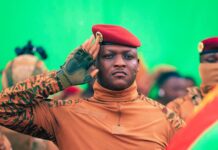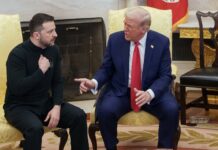Perhaps one of the most detrimental social trends of the last decade has been the fusing of politics with many aspects of social life. Particularly since Donald Trump’s entrance into politics in the United States, in tandem with the rise of more and more populist leaders around the world, the lines separating politics and culture have become more and more blurred.
Nowhere is this trend more apparent than in sports. It has become more frequently the case that high profile athletes have used their platforms to express political opinions. One of the most recent examples is that of France’s Kylian Mbappé, when he alluded to the fact that he wouldn’t be interested in representing France if the people vote for the so-called far-right party in France’s upcoming election, per Goal.com. In a press conference, he encouraged young French people to vote and warned against voting for “extremes.”
“We need to identify with this country, to identify with our values,
Kylian Mbappé
which are values of tolerance, diversity, and respect. I trust the
French, every voice counts. I really hope that we will make the right
choice, and that we will be proud to wear this jersey on July 7.”
Though Mbappé refrained from directly endorsing any political party, his comments have widely been interpreted as a rebuke of Marine Le Pen’s National Rally (RN) party, which is expected to perform well in the upcoming elections. Another French star, who had been less diplomatic with his words, was Marcus Thuram. He encouraged French voters “to fight every day” in order to prevent the National Rally from winning the election.
These sorts of statements from sports stars are often the subject of fierce debate online. There are many who view sports as purely a form of entertainment, and an escape from the division of normal life. Therefore, seeing such high-profile sports figures throwing their hats into the political arena, blurs the line between sports and politics, which many take issue with.
Similarly, we have seen other football stars being criticised for taking what have been seen as political stances. Another high profile example that comes to mind is that of Raheem Sterling, during the height of his campaigning against what he described as racial injustice in the United Kingdom. After it had been reported that he had been subjected to racial abuse by fans during a 2018 Premier League game, Sterling accused British newspapers of “fuelling racism” with their portrayal of young black footballers, per CNN. Moreover, Sterling would go on the record to criticise the lack of black representation in the Premier League ownership and among members of the league’s coaching staff.
In Nigeria, one example that comes to mind is when many of our sports stars had openly expressed political opinions was during the height of the #EndSars protests around the country. Numerous sports stars and celebrities had expressed their support for the protesters, protesting against police brutality. One of the most high profile sports stars to voice his opinion was Odian Ighalo, who had at the time been featuring as a striker for the Premier League side Manchester United.
In a post on social media, Ighalo slammed the Nigerian government as “a shame to the world” after a group of unarmed protesters had been shot at by the Nigerian army during the Lekki Toll Gate Massacre. He would go on to say in that post, “I am ashamed of this government, we are tired of you guys, and we can’t take this any more.”
However, easily the most egregious example of the politicisation of sports have been in the United States. Particularly since Donald Trump’s entrance into politics, the line between politics and sports has become nearly non-existence within certain sports disciplines.
The controversy around Colin Kaepernick kneeling during the US national anthem before games is the highest profile incident of the politicisation of sports. Kaepernick would kneel during the anthem to protest what he described as racial injustice in America. He stated that he could not stand to show pride in the flag of a country that oppressed black people. Kaepernick had been widely criticised by conservatives for disrespecting the US national anthem. Eventually, Kaepernick would lose his job as an American Football player after failing to sign with another team. It is widely alleged that this happened as a result of his political statements.
Donald Trump would slam NFL players who kneeled during the national anthem and called for them to be fired during a rally. Trump would say to his supporters, “Wouldn’t you love to see one of these NFL owners, when somebody disrespects our flag, to say, ‘Get that son of a b**** off the field right now. Out! He’s fired. He’s fired!’”
Trump would also have multiple clashes with basketball stars such as LeBron James. James would even once in a tween criticise Donald Trump, saying, “Going to [the] White House was a great honour until you showed up.” Donald Trump would also rescind an invitation to the White House to Stephan Curry and his team, the Golden State Warriors, after they “hesitated” to accept the invitation. Trump would call out Stephan Curry directly in a tweet.
Likewise, the US women’s team would snub a visit to the White after they had won the Women’s World Cup trophy. Megan Rapinoe famously said in an interview prior to their win that “I’m not going to the f******* White House.” Years later, after the Women’s team were knocked out in the 2023 Women’s World Cup, Trump took the opportunity to blame the loss on Megan Rapinoe and the country’s “woke” path under President Joe Biden.
The most recent high profile example of this trend was when the NFL star Harrison Butker criticised abortion and LGBT Pride in a commencement speech at a Catholic College in the US. His speech had been met with so much fury, nearly 160,000 people have signed a petition for his firing, according to the BBC.
I found the reaction to the Harrison Butker saga as being very ironic. As conservatives tend to be the ones most critical of stars expressing political opinions, as it is typically the case that liberal stars tend to be the ones more likely to make political statements. The “shut up and dribble” comment by Fox News host Laura Ingram, towards LeBron James, sparked fury as liberals arguing that James was free to express whatever opinions he wishes. However, when Harrison Butker a conservative star, expressed a conservative opinion there were calls for him to be fired by liberals and conservative Americans defending his statements.
Likewise, I have seen liberals complain about the “politicisation” of the UFC whenever Trump makes appearances during fights and receives a standing ovation from UFC fans. However, such complaints of politicisation are typically not expressed whenever liberals make overtly political statements. In fact, figures like Megan Rapinoe, and Marcus Thuram have been praised for expressing their liberal opinions.
I definitely fall on the side of keeping politics out of sports. Sports is entertainment at the end of the day, an escape from the issue of everyday life. Even from me, a person who consumes political content all the time, I prefer to not know about the political affiliations of sports stars. It makes something that should be entertaining and generally apolitical into something divisive. Likewise, just because a star has been given a platform because of their physical talents, doesn’t mean they are in any way well-informed on political matters, or should be telling regular people how they should feel about their values or their voting preferences.
Though that doesn’t mean I think there is no space for politics at all in sports. I think on certain special occasions, acts of defiance. Such as the so-called Black Power salute of Tommie Smith and John Carlos, two African-American athletes, at the Olympics during their medal ceremony. This happened during the 1968 Olympics, around the end of the civil rights era in the United States during the fight to abolish legalised racial segregation, discrimination, and disenfranchisement in the US.

However, it is easy to see that act of protest during a sporting event positively because of the era they were in. When racial discrimination had been government policy within the United States. It is easy to see past struggles for equality as clear-cut issues, given that people were fighting for equal rights in their own countries. However, in modern times, when political debates are more complex, similar political acts during sporting events are not always viewed as positively.











